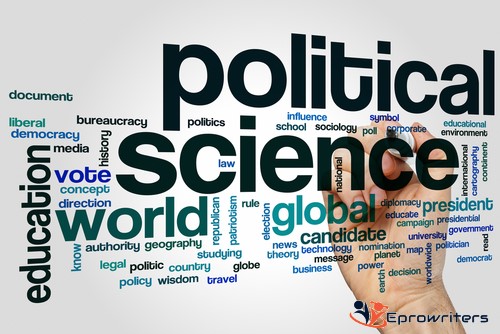- Top Quality Custom Essays
- +1 (628) 201-7932
- eprowriters01@gmail.com
Defend a claim about a relevant political concept or phenomenon …
Defend a claim about a relevant political concept or phenomenon …

Last updated on October 2nd, 2023 at 03:38 pm
Defend a claim about a relevant political concept or phenomenon, and to connect each of the following cultural artifacts to a concept or set of related concepts addressed in either
- An event
- A film
- A book or short story
- A painting
- A sculpture
- A musical composition
Details
The explanatory essay must conform either to MLA format or the Chicago Manual of Style, and be of sufficient length to incorporate each of the examples listed. The article you and your team compose should be a unified article, in that the reader should not be able easily to tell where one author ends and another begins.
This Project must include the following:
- A single discernible thesis. This is the main idea of your project. This thesis must be either analytical or expository in nature. It may serve an argumentative or persuasive purpose. However, the essay must conform to the Universal Intellectual Standards outlined by the Foundation for Critical Thinking.
- An appropriate thesis. Your team must relate the above cultural artifacts to a theme or concept in this course. In Texas Government, this means a topic connected to any of the following:
- Political culture or Ideology in Texas
- TX Constitutional Principles
- TX Constitutional Provisions
- Themes of the TX Constitution
- Federalism
- State constitutions
- Local government
- Public Opinion in Texas
- Political Socialization
- Texas Interest Groups
- Political parties in Texas
- Campaigning in Texas
- Texas Elections
- The Texas Legislature
- The Texas Executive
- State bureaucracies
- The state court system
- Members of any State institution in Texas
- Texas Public Policy Critique
- Texas Public Policy Commentary
- All text connected to the thesis. Do not pad any essay with irrelevant information. While it appears on the surface to improve page length, irrelevant information does nothing to support your thesis.
- Evidence to support the thesis. There are five classes of evidence: Facts, Authority, Logic, Statistics, and Experience. Logic is required. Your project must make sense. At least two other forms of evidence should be included to balance your support. Your evidence must be specific, and it must be enough to support your thesis. You must consult primary and secondary sources to find it.
- Complete Citations. Academic writing contains two classes of source documentation:
A critical annotated bibliography to be attached to your semester project.
These are the standards for this assignment:
You must have at least five academic, scholarly sources for your project. You must annotate your end-of-text citations by answering each of the following questions about each source:
- Purpose: What is the central aim of the source you are reading? What is the author trying to accomplish?
- Questions: What question is the author raising? What question does the author address?
- Information: What information or evidence is the author of the source using to support his/her claim?
- Inferences/Conclusions: What conclusions does the author make? How did the author reach the conclusion he/she/makes? Is there another way to interpret the information or evidence?
- Concepts: What is the main idea of the source? Please explain this idea.
- Assumptions: What is the author taking for granted? What assumptions led the author to reach his/her conclusion?
- Implications: What consequences result if one accepts the author’s position? What consequences result if one fails to accept the author’s position? What is the author implying?
- Points of View: From what point of view is the author looking at the issue? What are the author’s biases? Is there another valid point of view one should consider?
Need help with this or similar assignment?
- Tell Us Your Requirements: Please provide us with the specifics of your paper so that we may do our best to personalize it. Select the discipline, word count, format, academic level, and other details on the order form.
- Connect with the Best Writer: Consult and collaborate with an expert and complete your paper on schedule.
- Monitor the progress: Control the work process by checking the completed parts of your document right away. You can easily submit your comments by chatting with your essay writer on our website.
- Download Your Paper: Get your paper written according to your specifications. It is important to note that you only pay for an essay when you are completely satisfied with the outcome. Please provide us your feedback about our collaboration.
About Us
Eprowriters.com, and its afilliate blog Eprowriters.net, is a custom essay writing service that has been providing academic support with great success for more than five years. We are constantly updating our objectives in order to improve the quality of service we deliver and increase client satisfaction. We’ve progressed to an original concept as a result of our success.


